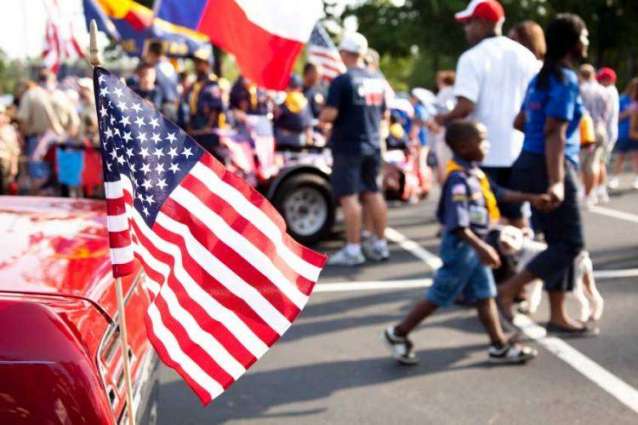July 4, which marks Independence Day in the United States, a federal holiday that commemorates the signing of the Declaration of Independence, is going to be different this year, as it will be affected by the coronavirus pandemic and take place amid ongoing protests against racial discrimination and injustice
MOSCOW (Pakistan Point News / Sputnik - 04th July, 2020) July 4, which marks Independence Day in the United States, a Federal holiday that commemorates the signing of the Declaration of Independence, is going to be different this year, as it will be affected by the coronavirus pandemic and take place amid ongoing protests against racial discrimination and injustice.
On July 4, 1776, in the Pennsylvania State House in Philadelphia, representatives of the 13 American colonies signed the document proclaiming the United States a state independent from British rule.
It became clear that this break with Great Britain was inevitable after the American Revolutionary War started in 1775.
On June 7, 1776, Richard Henry Lee of Virginia submitted a resolution of independence to the Second Continental Congress, the second of three constitutions of the original representative body for the colonies, that read that the "United Colonies are, and of right ought to be, free and independent States, that they are absolved from all allegiance to the British Crown, and that all political connection between them and the State of Great Britain is, and ought to be, totally dissolved."
On June 11, the Congress appointed a "Committee of Five," consisting of John Adams, Benjamin Franklin, Thomas Jefferson, Robert Livingston and Roger Sherman, to draft a declaration on the subject. The draft declaration was entrusted to the committee's chairman, Jefferson, a prominent figure in the Revolutionary War, who worked on the text for 17 days � from June 11 until June 28.
Jefferson's text, with minor editorial changes from Adams and Franklin, was presented to the Congress on June 28. The draft was amended many times in the discussions that followed, and the section condemning slavery and slave trade was notably removed.
Late on July 4, the text of "The Unanimous Declaration of the thirteen United States of America" was unanimously approved and signed by Congress President John Hancock and Charles Thomson, the secretary of the Continental Congress, which existed from 1774 until the Congress in its current form was established in 1789. It was then read aloud to the people gathered in front of the state house building.
The declaration became the first document in history that put the principle of popular sovereignty into the basis of a country's structure and rejected the theory of divine origin of state that was prevalent at the time.
The Declaration of Independence stated the people's right to revolt and overthrow a despotic government and proclaimed the fundamental ideas of democracy: the equality of people and their "certain unalienable rights, that among these are life, liberty and the pursuit of happiness."
The Declaration became not only the "birth certificate" of a new state but also a cornerstone in US literature, with Jefferson having managed to express the document's principles and ideas in a figurative language but also concisely and clearly.
The signing ceremony for the declaration, set down on parchment, took place on August 2, 1776. The Names of its 56 signatories made history, and many literary works and a memorial in Washington have been dedicated to them since.
Out of the 56 men who put their signatures on the Declaration of Independence, five were captured by the British and executed as traitors, nine died from wounds they received during the Revolutionary War, and many lost their wives, children and property. John Adams and Thomas Jefferson, who went on to become the nation's second and third presidents, respectively, died on the same day: July 4, 1826, exactly 50 years after the declaration was signed.
In 1870, Congress declared July 4 a federal holiday, and in 1938 it became a paid holiday.
The original copy of the Declaration of Independence is considered part of the country's heritage and is kept in a titanium case filled with inert argon gas at the National Archives building in Washington. In the daytime, the declaration is put on display, and at night, the case is lowered into a vault.
On Independence Day, actors dressed in 18th-century costumes traditionally perform in front of the archive's visitors and read the text of the Declaration aloud.
The main event of the day, the National Independence Day Parade, takes place at noon in Washington. The parade starts at 11:45 a.m. local time (15:45 GMT), and will travel along Constitution Avenue in the heart of the nation's capital.
It is one of the most important patriotic events in which a large number of musicians, military, actors and officials participate. Musical groups for the parade are selected from state musical educational institutions by the governor of each state.
The biggest national fireworks display is traditionally held not in Washington but over the East River in New York.
The most popular way to celebrate Independence Day is to have outdoor barbecues with family and friends.
In 2020, the event will be held a little different due to the ongoing pandemic, with local authorities asking citizens to celebrate the holiday outdoors, rather than indoors, while maintaining social distance. Some cities across the country have canceled parades and concerts but will still host fireworks shows without crowds gathering to watch. Within the context, a number of events will be streamed online so that people can enjoy them safely at home. Bars and restaurants will be closed to the public in many states, as well as beaches, to avoid the spread of the virus.
Apart from the pandemic, this year's Independence Day will be marked by ongoing anti-racism protests, which triggers concerns among officials that the weekend could see further clashes. With this regard, President Donald Trump's administration has set up so-called rapid deployment teams to guard federal monuments across the country.




